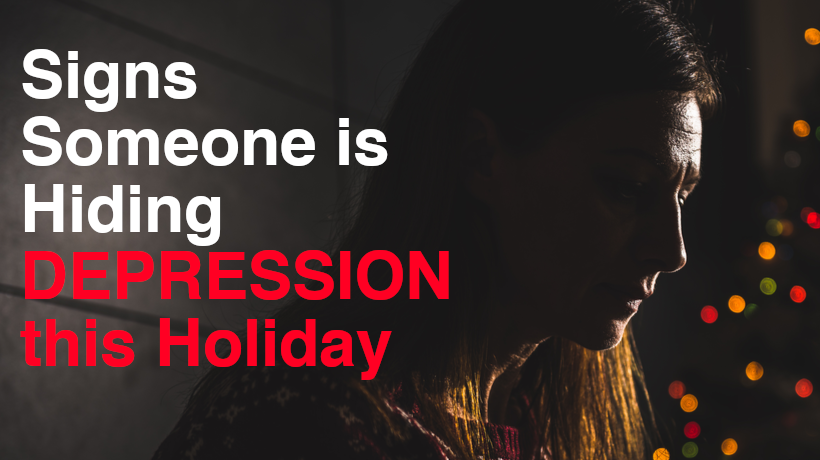For many, the holidays are a great way to spend some quality time with loved ones. However, hidden beneath the holiday cheer and twinkly lights, there are those who feel a lot different. According to the National Alliance on Mental Health, 64% of people with mental illness report holidays make their conditions worse. While there may be many reasons as to why people are sad during the holidays including grieving the loss of a loved one, the demands of holiday shopping, or even balancing cooking, family, and parties all at once.
Below are signs that someone is hiding depression this holiday season.
More withdrawn than usual
Is your loved one more withdrawn than usual? Dr. Michael Wetter, Los Angeles’ Cedars-Sinai Hospital psychologist, said this may be a sign that your loved one is stressed. If they seem more withdrawn than usual when doing activities with the family, it might be time to pull them aside and help them through this depression.
Lack of interest
If your loved one is lacking interest in things they once enjoyed doing (looking at holiday decorations, cooking with the family, etc) it may be a sign they have the holiday blues.
“Activities that are specifically related to the holiday itself, such as social events, family meals, and gift-giving, may actually trigger feelings of anxiety or sadness,” says Steven Gans, MD.
Drinking and eating more than normal
As stated above, activities can sometimes be a trigger for those who experience the holiday blues. In order to dull the sadness and anxiety, some people may resort to drinking or eating their troubles away.
While eating and drinking during the holidays (especially Thanksgiving) is usually encouraged and accepted, “Excessive drinking, overeating, and poor sleep can make the symptoms of the holiday blues even more pronounced.”
Sleeping a lot more than normal
The holidays are a time for goodness and cheer, but when someone is sleeping more than normal (possibly trying to sleep the holidays away), it may be a sign that they are hiding depressive symptoms. This may be due to grieving over the loss of a loved one, having financial difficulties, poor social circles, etc.
If your loved one is sleeping the day away, check up on them to see if they might need any assistance.
Feeling irritable and angry
If someone you love is snapping at you and every little thing, they may be experiencing depressive symptoms or holiday blues. Dillon Browne, Ph.D., said “In one study , higher levels of anger were associated with both mental stress and the possibility of a stress-related heart attack.”
Listen Closely
While this may not be a particular physical sign, the content your loved ones talk about maybe a great indicator of how they are feeling.
Wetter says, “Do they avoid talking about future plans? Are they making references of wanting to escape or that they have nothing to live for? These could be cues that someone is feeling hopeless and may even be entertaining serious thoughts of self-harm.”
How to help:
If you or a loved one is experiencing symptoms of depression over the holidays, it is imperative to have a good social support system as well as self-care tips to keep your head floating above the water.
Below are a few tips recommended by doctors and psychologists like Dr. Wetter.
Volunteer
Giving back is a great way to start the holiday. The staff at MayoClinic says, “If you feel lonely or isolated, seek out community, religious or other social events or communities. Many may have websites, online support groups, social media sites or virtual events. They can offer support and companionship.”
Be realistic
Sometimes we are depressed or stressed over the holidays because we want everything to be perfect (or better) than last year. However, this is not realistic. By setting realistic goals, you are able to take the pressure off yourself.
This year, especially, is going to be different with COVID-19 ruining a lot of Thanksgiving and Christmas traditions, but that still does not mean that the holidays can’t be fantastic!
Steven Gans, MD, says, “The key is to focus on those connections, create new traditions, and remember past holidays with fondness while still enjoying the one right in front of you. Focus on enjoying the experience and the time you get to spend with your loved ones rather than on achieving a picture-perfect end result.”
Acknowledge your feelings
Sometimes the best way to deal with the feelings of depression is to simply acknowledge them. Wetter suggests using these tips when talking to a loved one who may be suffering from holiday depression:
- Let them know that you are there for them and that they matter to you.
- Acknowledge that the holiday season can be difficult and that it’s OK not to feel happy or joyous.
- Express gratitude for having them in your life.
- Remind them that even though this might be a difficult or even painful time, things change and they will likely feel better at a later time.
- Most importantly, let them know that you love and care for them.
Learn to say no (and add self-care)
The holidays are a busy time for everyone — buying presents, wrapping them, cooking dinner for the family, etc. One way to reduce some of the stress is learning to say no. The staff at MayoClinic assure that friends and colleagues will understand if you can’t participate in every project or activity.
Avoid putting too much on your plate by saying no. “You can avoid overcommitting by knowing your limits and learning how to say no,” says Gans. When you absolutely might not be able to decline (i.e. when your boss asks you to stay a few extra hours) it is good to have some handy self-care tools at your disposal.
Sans states, “Just 15 to 20 minutes a day to enjoy some quiet time, read a book, listen to music, take a bath, do yoga, or some other relaxing activity can do wonders for your stress levels.”
Don’t abandon healthy habits
During the holidays, it is especially important to keep up with our healthy habits. That means exercising daily (with rest days of course), healthy eating, staying hydrated, getting plenty of sleep and “me time,” as well as limiting tobacco and alcohol usage.
When holiday depression turns into major depression
Seek a professional if you feel an intense amount of sadness for a long period of time. A professional may be able to direct you to someone who is willing to work on solving the issue at hand.
Timothy J. Legg, Ph.D., CRNP says, “ If your feelings of sadness during the holidays are accompanied by suicidal thoughts, do one of the following immediately:
- Call 911.
- Go immediately to a hospital emergency room.
- Contact the National Suicide Prevention Lifeline at 1-800-273-TALK (1-800-273-8255)
Sources:



